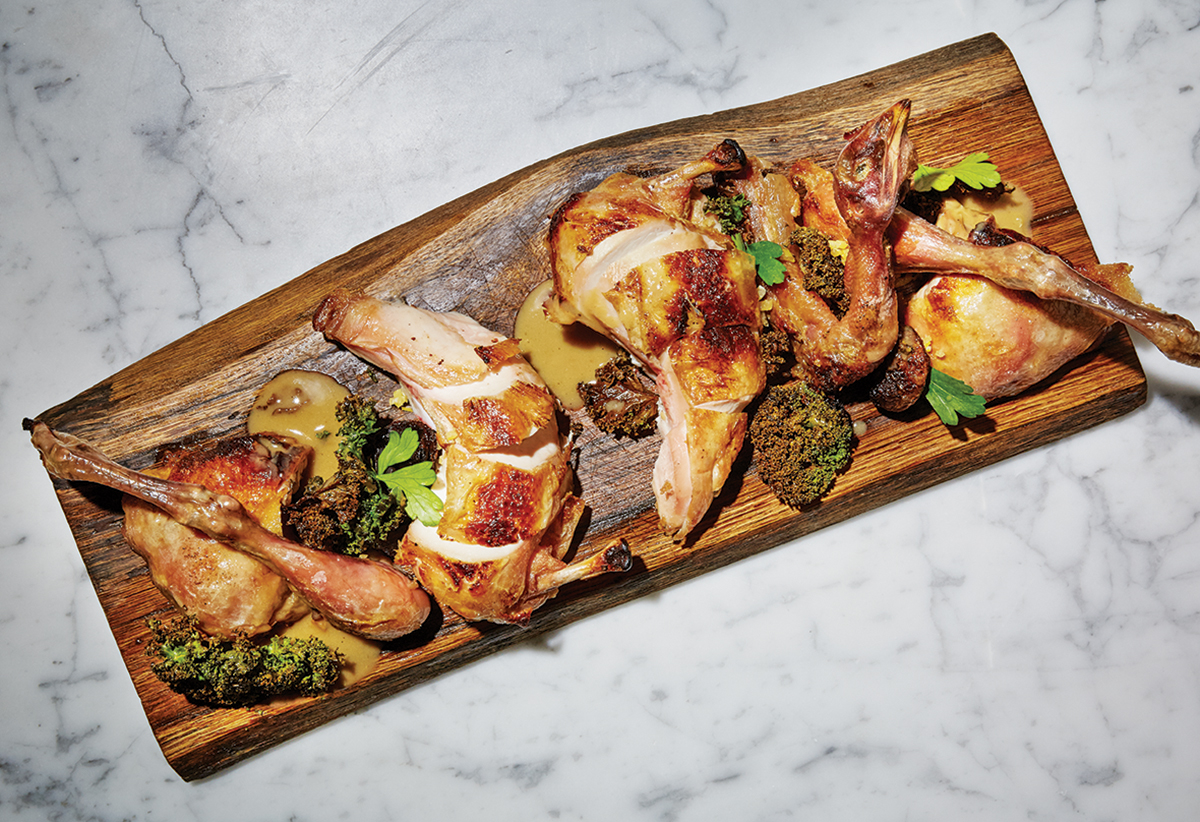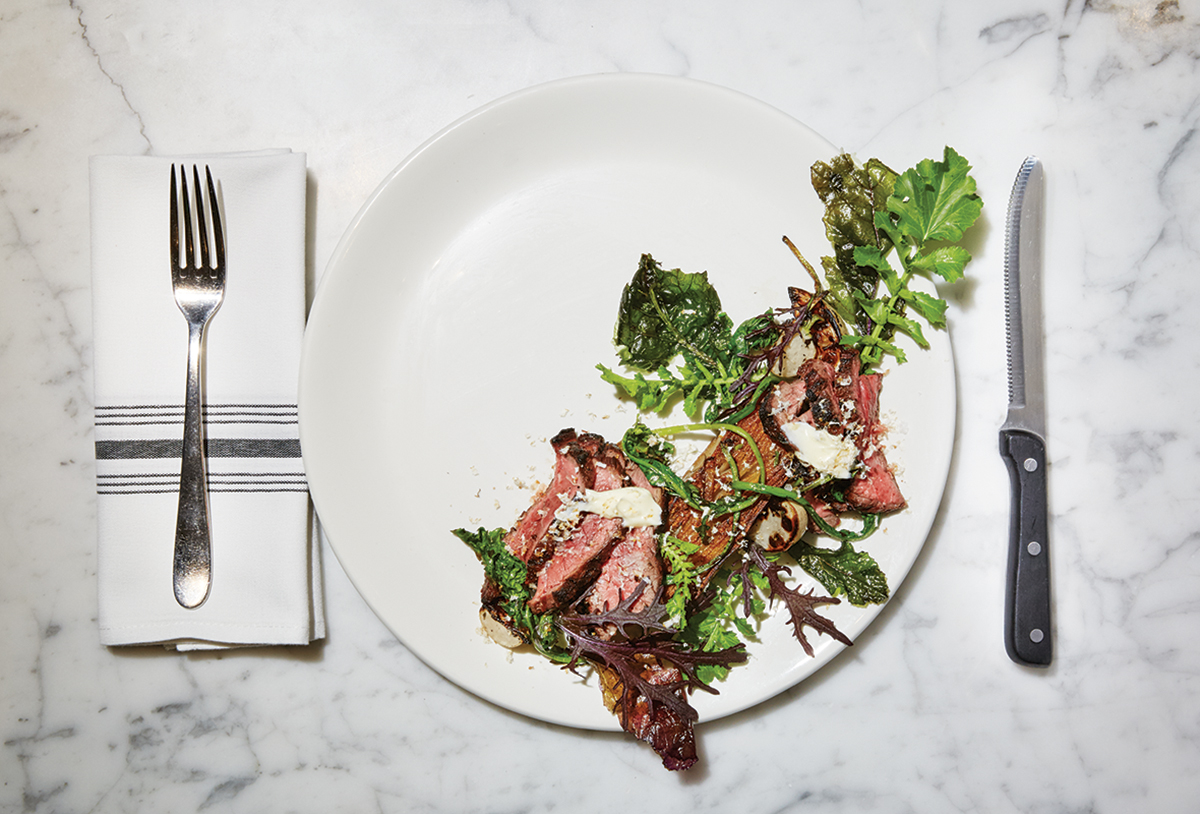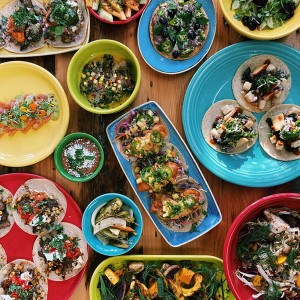Restaurant Review: Shepard in Cambridge

Wood-oven-roasted Feather Brook Farm chicken. / Photograph by Jim Brueckner
There’s something about haute couture—every handsewn seam and every length of luxurious silk, serge, or cashmere communicates a natural ease with perfection. That’s the dining experience at Shepard, where each element has been thought out, crafted by hand, and assembled with care and discernment. It doesn’t buzz; it purrs.
Since opening in June, Shepard has been almost solidly booked, as if after its predecessor, Chez Henri, closed, patrons had been huddling by the fireplace, waiting for the new restaurant to appear around them. Such a following seems only natural considering the hallowed location: For decades, the Cambridge spot was occupied by the beloved bistro Chez Jean. Paul O’Connell’s Chez Henri thrived during the subsequent two decades, consistently wowing Porter Square grad students.
Brattle Street’s increasingly moneyed denizens have priced out the students; accordingly, Shepard is perfectly tuned for the tonier bunch. It helps that Shepard’s founders, Rene Becker and Susan Regis, know their demographic better than anyone: Becker’s Hi-Rise Bread Company is an Observatory Hill fixture and standard-setter for artisanal bread in Cambridge; Regis won a James Beard Award during her long collaboration with Lydia Shire, and was the chef at Harvard Square’s venerable UpStairs on the Square.
Patrician, informed, yet understated, Shepard’s interior complements the Julia Child/Design Research crowd’s aesthetic. (Child herself was a friend of and formative influence on Regis.) Its minimalist Scandinavian features include gray wood-slat banquettes, blond-wood tables, and Windsor-esque chairs—about as Observatory Hill as you can get.

Grilled bavette steak with buttery new-potato pavé. / Photograph by Jim Brueckner
What saves Shepard from being too chic for its own good? For one, fermentation. These days, sourcing locally isn’t enough; chefs feel the need to create their own flavors in a kitchen’s microclimate. That’s a tenet of David Chang’s Momofuku empire, and Chang’s influence is most strongly felt locally at Ribelle, where Shepard chef de cuisine Peter McKenzie worked with Tim Maslow.
For another, fire. Regis’s sister, Lori, is a chef and co-owner of San Francisco’s Boulettes Larder, a chef’s favorite frequented by Alice Waters. Susan herself spent time foraging and cooking in the Bay Area, where she fell under the influence of another Waters–Chez Panisse offshoot, Oakland’s Camino, which focuses on flame-touched ingredients.
There are fewer fireworks here, though. Becker’s style is too restrained for that, and Regis’s cooking has evolved from the Indian-accented extravaganzas of Biba to the simpler Italian palate she brought to the short-lived, and wonderful, Pava, in Newton Centre. Together, their dishes reward you with unexpected pings of flavor—some from the herbs foraged at Allandale Farm, many from the downstairs larder of fermented goods.
The smoked bluefish pâté ($8) exemplifies what I mean by Cambridge couture. At first bite it seems old-line and fine, nothing more. But a second taste reveals an unexpected depth: Wood-oven-smoked, the fish is subtly spiked with fermented chilies and a swirl of lime-accented juice from house-made pickle brine. The fish pairs beautifully with the homemade seeded rye crackers by Leslie Mackie, who started as a pastry chef with Regis at Biba and has built a national reputation at Seattle’s Macrina Bakery. When Mackie first arrived at Shepard, she adapted her recipe to accommodate the Four Star Farms rye berries, which are toasted in the residual heat of the oven and then ground into flour.

The patrician dining room features minimalist Scandinavian accents. / Photograph by Jim Brueckner
As for the bread: If you assume you’ll get a generous sampling of Hi-Rise breads, given the owner and its proximity across the street, think again. There’s just one, a blond sesame semolina roll, which comes in precisely cut quarters with a tiny ramekin of marvelously airy homemade butter. Divine it is, yet tiny the portion. If you want more than one to two quarter-rolls a head, you’ll have to betray your un-WASPy greed and ask.
The larder that Regis and McKenzie credit for daily inspiration leads to revelations, including the crusty-skinned, crumbly fleshed sweet potatoes ($13) roasted with salt and herbs in the wood oven and served with pickled coriander berries and house-cultured black-garlic butter. Another discovery is the Jimmy Nardello peppers ($13)—startlingly sweet red peppers that McKenzie stuffs with black rice, currants, and sunflower seeds in a sweet-sour tomato sauce, an homage to his grandmother.
There are very few main courses compared with the abundant “petit” and “moins petit” selections—just three or four, including a disappointingly ho-hum soupe de poisson ($30). But two are choice. One is the sensational grilled bavette steak ($29), the meat chewy, beefy, and lush with fat. Beside it, a wedge of roasted potato pavé, its layers soaking in a bath of clarified butter.
The biggest plate of all, chicken roasted in the oven, might also be the most impressive: one really expensive bird ($58) from Feather Brook Farm in Raynham, served with the head and feet on, in the current fashion. I can do without reminders of mortality, but I certainly wouldn’t want to do without that chicken, especially now that Hamersley’s is gone. This isn’t the same—it’s much simpler, just air-dried and roasted, and without Hamersley’s herb-garlic marinade—but the marvelously moist chicken, with shatteringly crisp skin, will salve the wound for the wistful Hamersley’s crowd. The real trick here is achieving white and dark meat that’s equally moist, with a flavor so pure that you won’t need the gremolata-like kale pesto beneath it. Along with the neglected roast duck at Troquet, this goes to the top of Boston’s Best Bird list.
Desserts are few: Regis has confessed that she and McKenzie are savory cooks at heart and not much interested in sweets. It shows. The offerings are okay, and a small slice of brown-butter hazelnut cake with chocolate-pudding ice cream and buttermilk ($10) is better than that—just enough of everything to slake your need for a rich sweet.
Shepard is its own animal. And that’s an aristocrat: never too much of anything, everything done with care and with taste. It promises to please its already abundant crowds for a very long time.
★ ★ ★ ★
One Shepard St., Cambridge, 617-714-5295, shepardcooks.com.
Menu Highlights
Bavette steak, $29
Sweet potatoes, $13
Roast chicken, $58
Critic Corby Kummer—an editor at the Atlantic and author of The Pleasures of Slow Food—has been reviewing Greater Boston’s top restaurants in our pages since 1997.
★★★★ Extraordinary | ★★★ Generally Excellent | ★★ Good | ★ Fair | (No Stars) Poor


